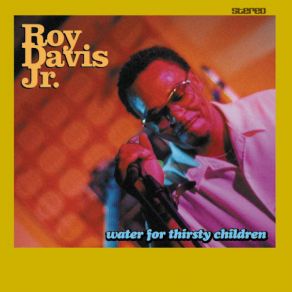Water for Thirsty Children
Download links and information about Water for Thirsty Children by Roy Davis Jr.. This album was released in 2004 and it belongs to Downtempo, Electronica, House, Hip Hop/R&B, Soul, Dancefloor, Dance Pop genres. It contains 10 tracks with total duration of 54:19 minutes.

|
|
|---|---|
| Artist: | Roy Davis Jr. |
| Release date: | 2004 |
| Genre: | Downtempo, Electronica, House, Hip Hop/R&B, Soul, Dancefloor, Dance Pop |
| Tracks: | 10 |
| Duration: | 54:19 |
| Buy it NOW at: | |
| Buy on Songswave €1.53 | |
| Buy on Amazon $8.99 | |
| Buy on iTunes $9.90 | |
| Buy on iTunes $9.90 | |
Tracks
[Edit]| No. | Title | Length |
|---|---|---|
| 1. | Water for Thirsty Children | 4:21 |
| 2. | Take a Ride | 4:00 |
| 3. | Melodies from Heaven | 4:30 |
| 4. | The Way We Were | 3:53 |
| 5. | I Love U | 2:44 |
| 6. | How Will You Know | 6:03 |
| 7. | Soldiers Listen | 7:15 |
| 8. | Dance Shake | 6:27 |
| 9. | Moving Up | 7:44 |
| 10. | Cherish | 7:22 |
Details
[Edit]Water for Thirsty Children, practically released in tandem with Chicago Forever, is an unexpected — but not out of character — change of style for Roy Davis Jr. It reminds of a time when a number of jazz musicians — Patrice Rushen, Norman Connors, George Duke, George Benson, and the like — uprooted themselves to make crossover records that were, essentially, R&B from top to bottom. And this is definitely an R&B record we have here, but in Davis' case it's house that he's pulling away from. Though Davis' work has almost always drawn heavily from '70s soul and funk (see the U.K. garage smash "Gabriel" or Traxx From the Nile's "There's a Place" for just two of several examples), he's never attempted to be part of that continuum to this extent. That means he's dealing in verse/chorus/verse structures, not just the occasional horn blurt and one-line vocal hook. Excepting a couple guest MCs, the first side is pure, mellow, modern R&B that could gain comparisons to anyone currently labeled neo-soul. That makes some sense, though not a great deal of it, since Davis sounds like he's been making records like this for well over a decade — well before neo-soul became a buzz word. The second half of the album picks up the tempo significantly and is, as a result, much more party-oriented. Extended disco/house rhythms take over, remaining drenched in soul and funk. As always, love, spirituality, and positivity are constant themes. The album proves that Davis, unlike just about any other producer connected to house music, could be capable of avoiding house's four/four thump completely for an entire hour — and with much success.